Giovana Kerche Bonás
Ticket-Bench: A Kickoff for Multilingual and Regionalized Agent Evaluation
Sep 17, 2025Abstract:Large language models (LLMs) are increasingly deployed as task-oriented agents, where success depends on their ability to generate accurate function calls under realistic, multilingual conditions. However, existing agent evaluations largely overlook cultural and linguistic diversity, often relying on monolingual or naively translated benchmarks. We introduce Ticket-Bench, a benchmark for multilingual agent evaluation in task-oriented scenarios. Ticket-Bench simulates the domain of soccer ticket purchases across six major languages: Portuguese, English, Spanish, German, Italian, and French. Using localized teams, cities, and user profiles to provide a higher level of realism. We evaluate a wide range of commercial and open-source LLMs, measuring function-calling accuracy and consistency across languages. Results show that reasoning-oriented models (e.g., GPT-5, Qwen3-235B) dominate performance but still exhibit notable cross-lingual disparities. These findings underscore the need for culturally aware, multilingual benchmarks to guide the development of robust LLM agents.
BRoverbs -- Measuring how much LLMs understand Portuguese proverbs
Sep 10, 2025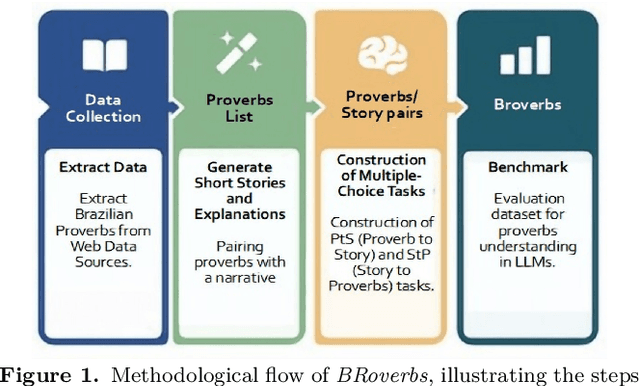
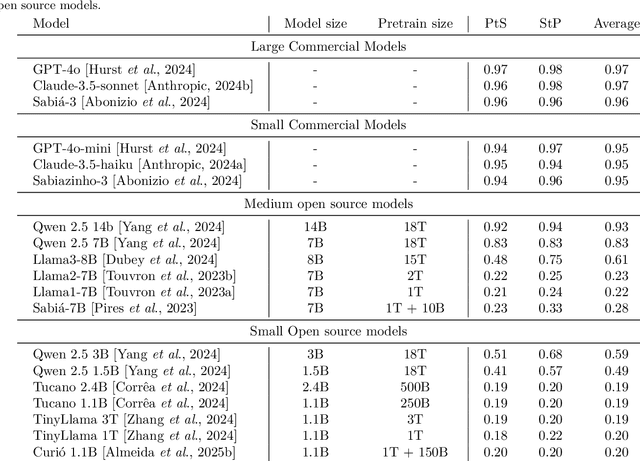
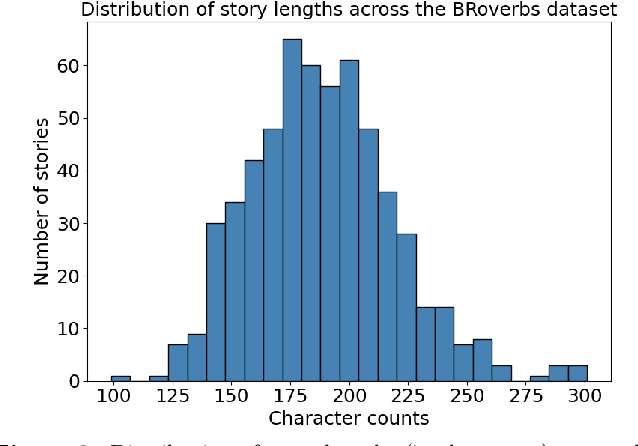
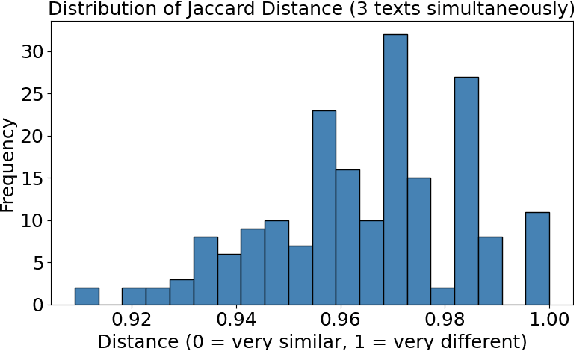
Abstract:Large Language Models (LLMs) exhibit significant performance variations depending on the linguistic and cultural context in which they are applied. This disparity signals the necessity of mature evaluation frameworks that can assess their capabilities in specific regional settings. In the case of Portuguese, existing evaluations remain limited, often relying on translated datasets that may not fully capture linguistic nuances or cultural references. Meanwhile, native Portuguese-language datasets predominantly focus on structured national exams or sentiment analysis of social media interactions, leaving gaps in evaluating broader linguistic understanding. To address this limitation, we introduce BRoverbs, a dataset specifically designed to assess LLM performance through Brazilian proverbs. Proverbs serve as a rich linguistic resource, encapsulating cultural wisdom, figurative expressions, and complex syntactic structures that challenge the model comprehension of regional expressions. BRoverbs aims to provide a new evaluation tool for Portuguese-language LLMs, contributing to advancing regionally informed benchmarking. The benchmark is available at https://huggingface.co/datasets/Tropic-AI/BRoverbs.
TiEBe: A Benchmark for Assessing the Current Knowledge of Large Language Models
Jan 13, 2025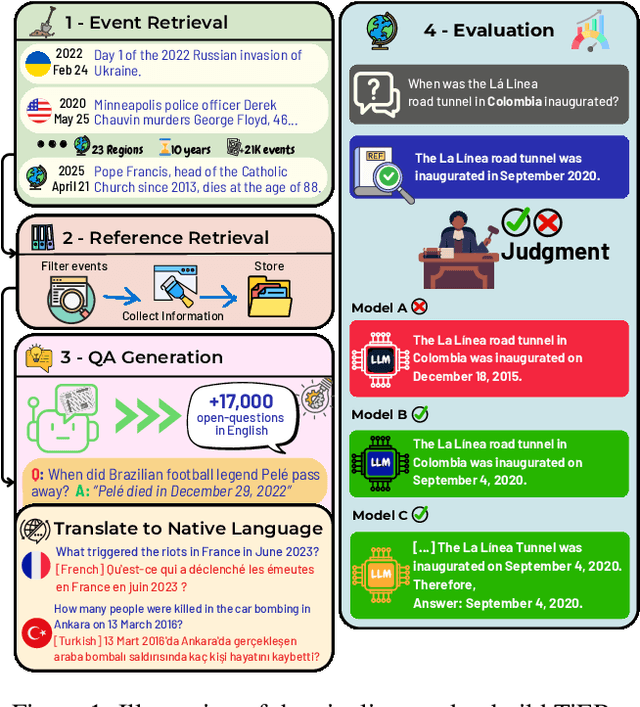
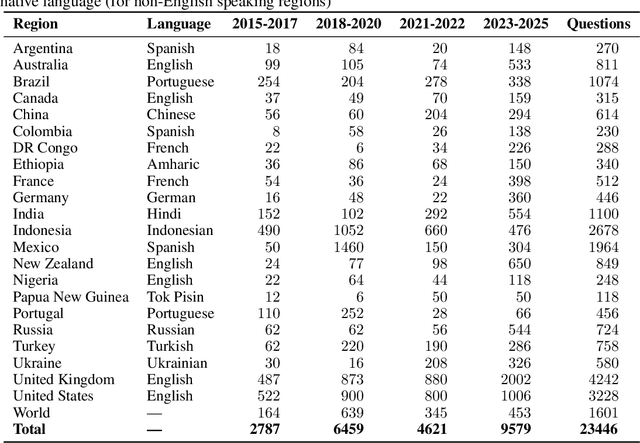
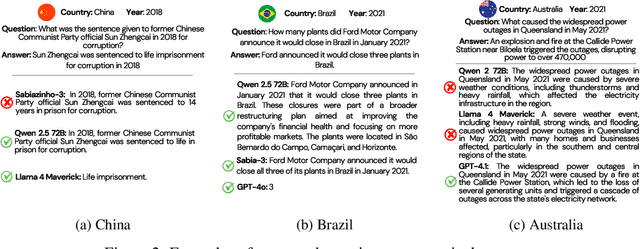
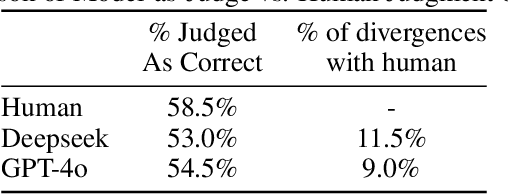
Abstract:In a rapidly evolving knowledge landscape and the increasing adoption of large language models, a need has emerged to keep these models continuously updated with current events. While existing benchmarks evaluate general factual recall, they often overlook two critical aspects: the ability of models to integrate evolving knowledge through continual learning and the significant regional disparities in their performance. To address these gaps, we introduce the Timely Events Benchmark (TiEBe), a dataset containing over 11,000 question-answer pairs focused on globally and regionally significant events. TiEBe leverages structured retrospective data from Wikipedia, enabling continuous updates to assess LLMs' knowledge of evolving global affairs and their understanding of events across different regions. Our benchmark demonstrates that LLMs exhibit substantial geographic disparities in factual recall, emphasizing the need for more balanced global knowledge representation. Furthermore, TiEBe serves as a tool for evaluating continual learning strategies, providing insights into models' ability to acquire new information without forgetting past knowledge.
Sabiá-3 Technical Report
Oct 15, 2024Abstract:This report presents Sabi\'a-3, our new flagship language model trained on a large brazilian-centric corpus. Evaluations across diverse professional and academic benchmarks show a strong performance on Portuguese and Brazil-related tasks. Sabi\'a-3 shows large improvements in comparison to our previous best of model, Sabi\'a-2 Medium, especially in reasoning-intensive tasks. Notably, Sabi\'a-3's average performance matches frontier LLMs, while it is offered at a three to four times lower cost per token, reinforcing the benefits of domain specialization.
 Add to Chrome
Add to Chrome Add to Firefox
Add to Firefox Add to Edge
Add to Edge